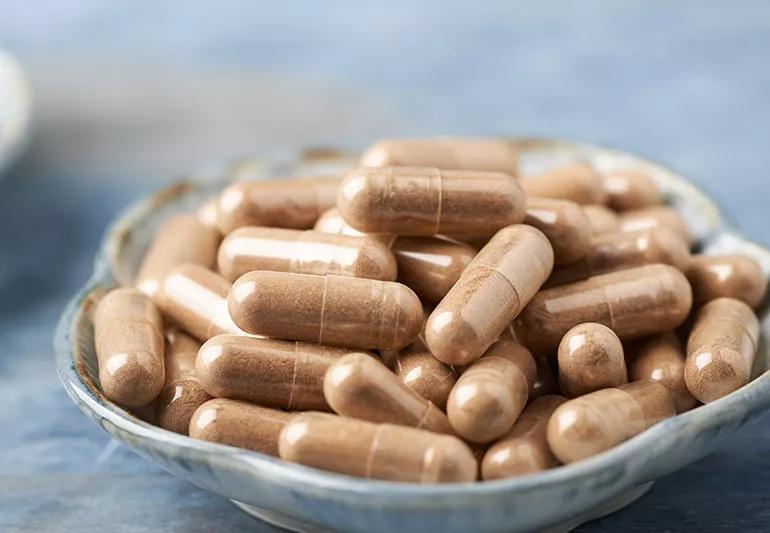The energy drink staple packs a caffeine punch, but caution is recommended

Image content: This image is available to view online.
View image online (https://assets.clevelandclinic.org/transform/c24d3031-fdc6-413f-a496-165547f826b0/greenTeaExtractPills-1134918443-770x533-1_jpg)
Green tea extract in Pill formula
Read the label on any energy drink and you’ll likely find green tea extract among the ingredients working to give you extra zip. But is this so-called “natural energy booster” really a fatigue fighter? And are there other potential benefits?
Advertisement
Cleveland Clinic is a non-profit academic medical center. Advertising on our site helps support our mission. We do not endorse non-Cleveland Clinic products or services. Policy
Before you open that bottle of jolt juice or swallow a green tea extract supplement, let’s take a closer look with integrative medicine specialist Irina Todorov, MD.
Odds are you’re familiar with green tea, one of the most consumed drinks in the world. Well, green tea extract is basically a concentrated form of the popular tea that’s made from dried green tea leaves.
Green tea extract does contain caffeine, which explains why it frequently lands in energy drinks.
It’s also chock full of antioxidants and plant compounds called catechins that provide the foundation for many boost-your-health claims.
A catechin named epigallocatechin gallate, or EGCG, gets most of the marketing attention. You’ve probably seen its presence hyped on energy drinks and supplements.
The resume for green tea extract is pretty expansive. Aside from adding some oomph to your system with caffeine, it’s touted for weight loss, lowering your risk of heart disease, skin health and more.
But here’s the question: Does it really do all of that?
The caffeine does pack a definite punch. But Dr. Todorov cautions against relying on energy drinks — responsible for a rising incidence of caffeine toxicity among adolescents — to power through the day.
Advertisement
Studies of green tea extract’s effect on athletic performance have been inconclusive, too, so don’t look for it to provide a competitive edge.
Quite simply, there are better ways to boost your energy besides unscrewing the top of a bottled drink and guzzling down the contents, says Dr. Todorov. She suggested lifestyle changes such as:
Research on using green tea extract for weight loss has found it can help lower the number on your scale — but don’t expect miracles. One study, for instance, shows any connection to be “modest at best.”
“In my opinion, patients can achieve the same amount of weight loss with lifestyle changes, and avoid the risk of side effects and the cost of supplements,” says Dr. Todorov.
Drinking green tea itself is associated with a lower risk of coronary artery disease. So, what happens when you pack all of that goodness into green tea extract? Basically, you see similar results.
One study found that taking a 379 milligram (mg) daily dose of green tea extract can help improve blood pressure and cholesterol numbers.
Dr. Todorov also gives green tea extract a thumbs up for skin health because of its antioxidant properties. Studies show it can help reduce acne and help aging skin reclaim some of its lost glow.
Too much caffeine is never a good thing, and it’s possible to push the limits with green tea extract. Excessive caffeine can lead to heart palpitations, high blood pressure, anxiety and other issues.
In addition, overdoing it on green tea extract has been linked to liver problems.
Part of the issue has to do with federal labeling requirements. Food and drink manufacturers don’t have to list the amounts of green tea extract or EGCG, which means you won’t know how much of it you’re consuming.
How do bottled green teas rate as a beverage? After all, they contain ECGC.
Bottled green teas also contain sugar or other sweeteners, notes Dr. Todorov. Plus, they’re expensive, and — as mentioned — their caffeine and EGCG content is not stated on the label.
“It’s better to enjoy a cup of green tea,” she says. “No evidence of toxicity has been reported from drinking green tea, even when you regularly consume two to four cups a day.”
Advertisement

Sign up for our Health Essentials emails for expert guidance on nutrition, fitness, sleep, skin care and more.
Learn more about our editorial process.
Advertisement
Catechins (antioxidants) in green tea help fight inflammation and diabetes, while improving memory and heart health
This subtly minty beverage can help balance hormones and loosen stiff joints
Weeds be gone! This tea contains lots of antioxidants and may help reduce inflammation
Flavonoids in black tea are good for your health, helping prevent strokes and heart disease
Research is limited, but there’s evidence the fermented tea offers some health benefits
From antioxidants to anti-inflammatory effects, a dietitian explains all
There’s a perfect tea option for every condition
Study reveals hot tea can raise esophageal cancer risk
Prioritize your health by managing stress, strengthening your social connections and getting quality sleep
Bolsters, blankets, pillows and blocks can offer extra support, stability and comfort
Allergies, postnasal drip, asthma or reflux could be to blame for a cough that won’t quit